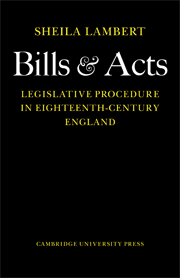Book contents
- Frontmatter
- Contents
- Preface
- Abbreviations
- Introduction
- 1 Robert Harper and parliamentary agency
- 2 Treatises and handbooks
- 3 The clerks: fees and agency
- 4 Parliamentary business
- 5 Private bill procedure
- 6 Estate bills
- 7 Inclosure bills
- 8 Local bills
- 9 Promulgation of the statutes
- 10 Conclusion
- Appendix I List of bills drawn by Robert Harper
- Appendix II Note on parliamentary sources
- Index
- Frontmatter
- Contents
- Preface
- Abbreviations
- Introduction
- 1 Robert Harper and parliamentary agency
- 2 Treatises and handbooks
- 3 The clerks: fees and agency
- 4 Parliamentary business
- 5 Private bill procedure
- 6 Estate bills
- 7 Inclosure bills
- 8 Local bills
- 9 Promulgation of the statutes
- 10 Conclusion
- Appendix I List of bills drawn by Robert Harper
- Appendix II Note on parliamentary sources
- Index
Summary
It is when one turns to local bills that parliamentary controversy is to be expected; it was with these bills that the time of parliament was unnecessarily taken up; and it is they that have given private bill legislation in general a bad name. It is for local bills that the immensely complicated precautions embodied in the nineteenth-century standing orders had to be invented, which Dr Williams at such laborious length explained.
The content of these local acts has been discussed at great length by Clifford and the Webbs who concentrated on the nineteenth-century development of municipalities; that is, the manner in which local authorities obtained powers to deal with finance, sanitation, water supply and so forth. This type of legislation in the eighteenth century is well described by Spencer. The acts relating to transport by road, river and rail, are discussed by Jackman; there have also been many local studies of particular projects. The nature of the materials in the House of Lords manuscripts for the study of these topics has been described by Mr Bond and Mr Cobb. There is no need to go over this ground again.
Both Clifford and Williams chose the Bridgewater canal bill of 1762 as an example for a description of the outline of procedure in the House of Commons. Neither remarks on one of its most striking attributes: it became a private, not a public, act as was the case also with the Duke's three other measures concerning his navigation.
- Type
- Chapter
- Information
- Bills and ActsLegislative procedure in Eighteenth-Century England, pp. 150 - 171Publisher: Cambridge University PressPrint publication year: 1971



